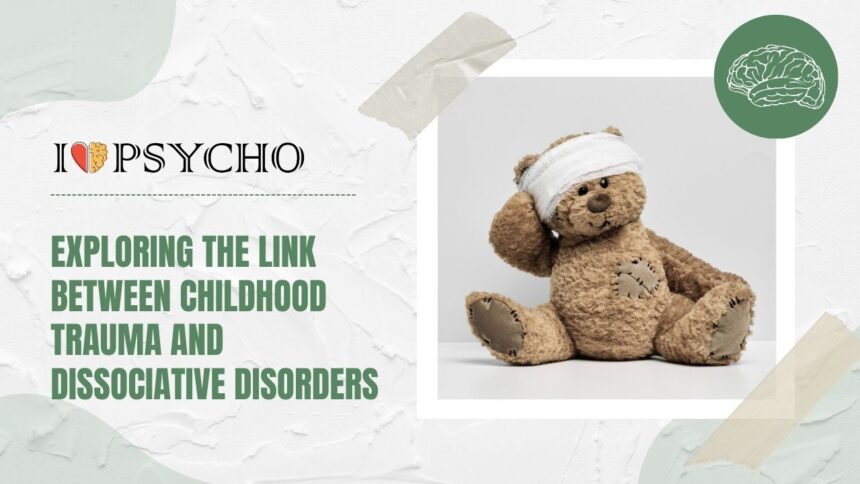Introduction to Childhood Trauma and Dissociative Disorders
Childhood is supposed to be a time of innocence, playfulness, and discovery. However, for some individuals, it can also be a period marked by trauma and distress. The lingering effects of childhood trauma can manifest in various ways, one of which is through dissociative disorders. These disorders can significantly impact an individual’s mental health and overall well-being. In this blog post, we will delve into the complex link between childhood trauma and dissociative disorders, exploring the types, symptoms, treatment options, and strategies for coping with these challenges. Let’s embark on this journey together to gain a deeper understanding of how early experiences can shape our mental health outcomes later in life.
Understanding Dissociative Disorders: Types and Symptoms
Dissociative disorders are complex mental health conditions that involve disruptions in a person’s memory, identity, consciousness, or perception of the environment. There are several types of dissociative disorders, with Dissociative Identity Disorder (DID) being the most well-known. DID is characterized by the presence of two or more distinct personality states.
Another type is Depersonalization-Derealization Disorder, where individuals feel detached from themselves or their surroundings. Dissociative Amnesia involves difficulty remembering important information about oneself. Symptoms can vary from gaps in memory to feeling like you’re watching yourself from outside your body.
Individuals with dissociative disorders may also experience depersonalization, derealization, identity confusion, and even amnesia for events in their past. It’s crucial to seek professional help if you suspect you or someone you know may be struggling with these symptoms. Understanding the different types and symptoms of dissociative disorders is essential for early detection and proper treatment.
The Impact of Childhood Trauma on Mental Health
Childhood trauma can have a profound impact on mental health, shaping the way individuals perceive and navigate the world around them. The experiences of abuse, neglect, or other forms of trauma during formative years can leave lasting emotional scars that manifest in various ways.
For many individuals who have experienced childhood trauma, their mental health may be significantly affected, leading to conditions such as anxiety disorders, depression, PTSD, and even dissociative disorders. These conditions can interfere with daily functioning and relationships if left unaddressed.
It is crucial to recognize the correlation between childhood trauma and mental health struggles to provide appropriate support and interventions for those in need. Seeking therapy or counseling can help individuals process their traumatic experiences and develop healthy coping mechanisms to improve their overall well-being. Remember that healing is possible with proper care and support.
Exploring the Connection between Trauma and Dissociative Disorders
Childhood trauma can have a profound impact on an individual’s mental health, potentially leading to the development of dissociative disorders. These disorders involve disruptions in memory, consciousness, identity, and perception of the self and the world around them.
Individuals who have experienced trauma may dissociate as a way to cope with overwhelming emotions or memories that are too distressing to process consciously. Dissociation serves as a defense mechanism for the mind to protect itself from further harm.
The link between childhood trauma and dissociative disorders is complex and multifaceted. Trauma can manifest in various forms such as physical abuse, emotional neglect, or exposure to violence, all of which can significantly increase the risk of developing dissociative symptoms.
Understanding this connection is crucial for providing effective treatment and support for individuals struggling with both trauma and dissociation. Therapy approaches like cognitive-behavioral therapy (CBT) and Eye Movement Desensitization Reprocessing (EMDR) have shown promising results in helping individuals heal from their past experiences.
By exploring this intricate relationship between trauma and dissociative disorders, we can work towards creating a more compassionate and understanding environment for those facing these challenges.
Treatment Options for Individuals with Dissociative Disorders
Individuals with dissociative disorders often require a personalized treatment approach tailored to their specific needs. Therapy is a cornerstone in the treatment of dissociation, with techniques such as cognitive-behavioral therapy (CBT) and dialectical behavior therapy (DBT) being commonly used. These therapies help individuals identify triggers, manage emotions, and develop coping strategies.
In addition to therapy, medication may be prescribed to address symptoms like anxiety or depression that often accompany dissociative disorders. Collaborating closely with mental health professionals is crucial for developing an effective treatment plan. Alternative treatments such as art therapy or mindfulness practices can also complement traditional methods and provide additional tools for managing dissociation.
Support groups offer individuals the opportunity to connect with others who understand their experiences, fostering a sense of community and validation. A multifaceted approach that combines various therapeutic modalities is key in supporting individuals on their journey towards healing and recovery from dissociative disorders.
Coping with Childhood Trauma and Managing Dissociation
Coping with childhood trauma and managing dissociation can be a challenging journey. It’s essential to prioritize self-care and seek support from mental health professionals. Engaging in therapy, such as cognitive behavioral therapy or dialectical behavior therapy, can help individuals process their past experiences and develop healthier coping mechanisms.
Practicing mindfulness techniques like deep breathing exercises or meditation can also aid in grounding oneself during moments of dissociation. Building a strong support network of trusted friends or family members who understand the complexities of trauma can offer comfort and validation.
Engaging in creative outlets like art, writing, or music can provide a therapeutic release for emotions that may be difficult to verbalize. Taking time for self-reflection and introspection allows individuals to better understand their triggers and patterns of dissociation.
Remember, it’s okay not to have all the answers right away. Healing from childhood trauma takes time and patience. Be gentle with yourself as you navigate this process of coping and healing.
Breaking the Stigma and Seeking Help
It’s time to break free from the chains of stigma surrounding mental health issues. Seeking help for childhood trauma or dissociative disorders is a brave step towards healing and recovery. Remember, it’s okay not to be okay, and reaching out for support is a sign of strength, not weakness.
Talking openly about your experiences can help reduce shame and isolation. Whether it’s through therapy, support groups, or trusted friends and family members, sharing your story can be empowering. Don’t let fear hold you back from getting the assistance you deserve.
Seeking professional help from therapists or counselors who specialize in trauma-related disorders can provide valuable insights and coping strategies. Remember that you are not alone on this journey – there are resources available to guide you towards healing.
By breaking the silence and seeking help, you take control of your narrative and pave the way for positive change in your life. Embrace the opportunity to prioritize your mental well-being and embark on a path towards self-discovery and growth without hesitation.
Conclusion
In the journey of understanding the link between childhood trauma and dissociative disorders, it becomes evident that these experiences can deeply impact an individual’s mental health. The enduring effects of trauma can manifest in various forms of dissociation, affecting how individuals perceive and interact with the world around them.
Recognizing the signs and symptoms of dissociative disorders is crucial for early intervention and treatment. Seeking professional help from therapists or psychiatrists who specialize in trauma-informed care can provide much-needed support for those struggling with dissociation.
Breaking the stigma surrounding mental health issues is essential in creating a safe space for individuals to seek help without fear of judgment. By fostering open conversations and promoting awareness, we can encourage those affected by childhood trauma and dissociative disorders to reach out for assistance.
By acknowledging the connection between childhood trauma and dissociative disorders, we take a step towards healing and recovery. With proper treatment, coping mechanisms, and support systems in place, individuals can work towards reclaiming their sense of self and moving forward on a path towards healing. Remember, you are not alone on this journey – there is hope for a brighter future ahead.







